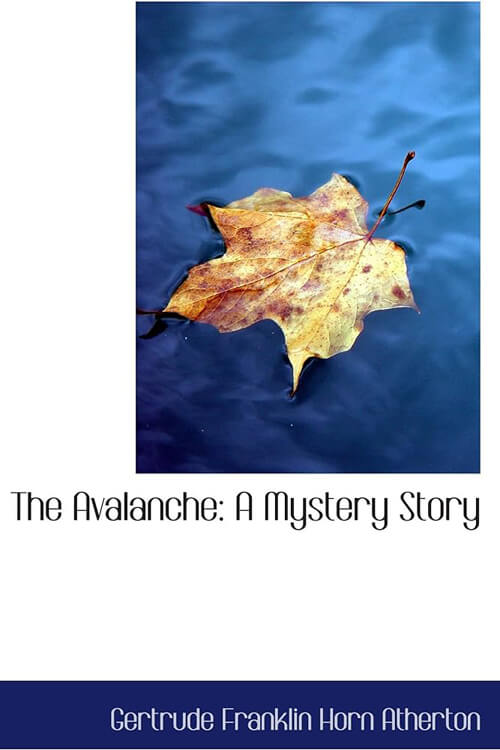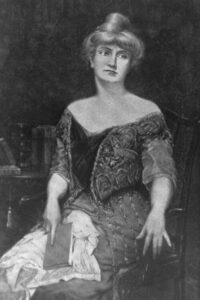
The Avalanche, A Mystery Story
Price Ruyler knew that many secrets had been inhumed by the earthquake and fire of San Francisco and wondered if his wife’s had been one of them. After all, she had been born in this city of odd and whispered pasts, and there were moments when his silent mother-in-law suggested a past of her own.
That there was a secret of some sort he had been progressively convinced for quite six months. Moreover, he felt equally sure that this impalpable gray cloud had not drifted even transiently between himself and his wife during the first year and a half of their marriage. They had been uncommonly happy; they were happy yet … the difference lay not in the quality of Hélène’s devotion, enhanced always by an outspoken admiration for himself and his achievements, but in subtle changes of temperament and spirits.
She had been a gay and irresponsible young creature when he married her, so much so that he had found it expedient to put her on an allowance and ask her not to run up staggering bills in the fashionable shops; which she visited daily, as much for the pleasure of the informal encounter with other lively and irresponsible young luminaries of San Francisco society as for the excitement of buying what she did not want.
He had broached the subject with some trepidation, for they had never quarreled; but she had shown no resentment whatever, merely an eager desire to please him. She even went directly down to the Palace Hotel and reproached her august parent for failing to warn her that a dollar was not capable of infinite expansion.
But no wonder she had been extravagant, she told Ruyler plaintively. It had been like a fairy tale, this sudden release from the rigid economies of her girlhood, when she had rarely had a franc in her pocket, and they had lived in a suite of the old family villa on one of the hills of Rouen, Madame Delano paying her brother for their lodging, and dressing herself and Hélène with the aid of a half-paralyzed seamstress with a fiery red nose. It was the nightmare of her youth, that nose, and that croaking voice. But the woman had fingers, and a taste! And her mother could have concocted a smart evening frock out of an old window curtain.
But the petted little daughter was never asked to go out and buy a spool of thread, much less was she consulted in the household economies.
Read or download Book
Gertrude Atherton
Gertrude Franklin Horn Atherton (October 30, 1857 – June 14, 1948) was an American writer. Many of her novels are set in her home state of California. Her bestselling novel Black Oxen (1923) was made into a silent movie of the same name. In addition to novels, she wrote short stories, essays, and articles for magazines and newspapers on such issues as feminism, politics, and war.
Early life
Gertrude Franklin Horn was born on October 30, 1857, in San Francisco, California, to Thomas Ludovich Horn and his wife, the former Gertrude Franklin. Her father had become a prominent citizen in San Francisco as a tobacco merchant, although he originally hailed from Stonington, Connecticut. Her mother was from New Orleans. Her parents separated in 1860 when she was two years old, and she was raised by her maternal grandfather, Stephen Franklin, a devout Presbyterian and a relative of Benjamin Franklin. Grandfather Franklin insisted she was well-read, and this influenced her greatly. She attended St. Mary’s Hall High School in Benicia, California, and, briefly, the Sayre School in Lexington, Kentucky.
Gertrude moved back to California to live with her grandfather and mother after her aunt refused to house her any longer because of her rebelliousness. There she met George H.B. Atherton, son of Faxon Atherton, who was courting her mother. He became more interested in his daughter Gertrude, and after she accepted his sixth proposal, they eloped on February 15, 1876. She went to live with him and his domineering Chilean mother. Gertrude found life in the Atherton mansion in San Francisco and on their Fair Oaks estate, now Atherton, California, stultifying. As a result of her disappointment with the marriage, she began to develop an independent life. Two tragedies changed her life dramatically: Her son George died of diphtheria, and her husband died at sea. She was left alone with their daughter Muriel and needed to support herself. Her mother-in-law agreed to raise Muriel and give her the inheritance that would have gone to George.
Atherton later told an interviewer that the books that had influenced her the most were Hippolyte Taine’s “History of English Literature” and the books of Herbert Spencer.
Career
Atherton’s first publication was “The Randolphs of Redwood: A Romance”, serialized in The Argonaut in March 1882 under the pseudonym Asmodeus. When she revealed to her family that she was the author, she was ostracized. In 1888, she left for New York, leaving Muriel with her grandmother. She traveled to London and eventually returned to California. Atherton’s first novel, What Dreams May Come, was published in 1888 under the pseudonym Frank Lin.
In 1889, Atherton went to Paris at the invitation of her sister-in-law Alejandra Rathbone (married to Major Jared Lawrence Rathbone). That year, she heard from British publisher G. Routledge and Sons that they would publish her first two books. William Sharp wrote in The Spectator praising her fiction and would later invite Atherton to stay with him and his wife, Elizabeth, in South Hampstead.
In London, Atherton had the opportunity through Jane Wilde to meet her son, Oscar Wilde. She recalled in her memoir Adventures of a Novelist (1932) that she made an excuse to avoid the meeting because she thought he was physically repulsive. In an 1899 article for London’s Bookman, Atherton wrote of Wilde’s style and associated it with “the decadence, the loss of virility that must follow over-civilization.”
Also in London, she met a young Winston Churchill, who said that he liked her novels. Soon she found out that Churchill was disappointed that she did not return the compliment—she was not aware of his writing.
Atherton returned to California in 1890 at the death of her grandfather Franklin and her mother-in-law Dominga Atherton, and she resumed care of Muriel. In 1891, while writing a weekly column for The San Francisco Examiner, she met Ambrose Bierce, with whom she carried on a taunting, tumultuous friendship.
When Kate Field remarked on California writers’ neglect of the picturesque and romantic old Spanish life of the state, Atherton explored the history and culture of Spanish California in Monterey, San Juan Bautista, Los Angeles, San Luis Obispo, and Santa Barbara. She became a member of the Pacific Coast Women’s Press Association.
Atherton wrote The Doomswoman in 1892, and it was published in Lippincott’s Monthly Magazine before being published in book form in 1893. The story (set in the 1840s) focuses on Chonita Moncada y Iturbi and her love of Diego Estenega (modeled after Mariano Guadalupe Vallejo), as he dreams of modernizing California, retaining its Mexican character without sacrificing American economic vigor. Chonita is Catholic, and her faith stands in the way of Diego’s political ambitions. The dramatic climax peaks when Diego kills Chonita’s brother, Reynaldo, and she is forced to choose between her cultural loyalty and her love for Diego. The plot of the novel closely resembles that of Romeo and Juliet. The book was successful with critics, some comparing it to Helen Hunt Jackson’s Ramona. Atherton was not pleased with this comparison because Jackson was not from California. However, she was satisfied when Bierce said of The Doomswoman that it was “in its class… superior to any that any Californian has done”.






